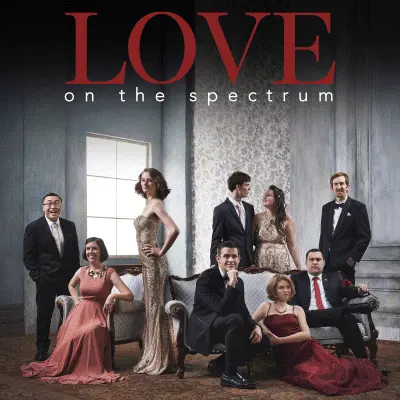Netflix's Love on the Spectrum is dating reality show that celebrates autism
-

The five-part Love on the Spectrum feels "of its moment, taking the time to explore the lives of its participants in greater depth, which results in a program filled with joy, warmth and insight," says Rebecca Nicholson. "It is frequently very funny, but crucially, that is never at the expense of anyone on camera. Looking for love can be complicated and absurd for anyone, and the program highlights some of the pitfalls...What is lovely about this series, compared to other dating shows, is that it gives everyone it follows the time to develop their stories in detail. I always look forward to the “what happened next” at the end of every episode of, say, First Dates. This has enough time and space for it to feel like less of a surface intrusion. We find out what happens next in the very next episode. Dating shows can be curiously lacking in love, sometimes; the pursuit of love does not always equal the winning of it. But Love on the Spectrum is packed with love, not just of the romantic kind, but from family, friends and community."
ALSO:
- Love on the Spectrum is TV's most honest dating reality show: It captures dating moments recognizable to anyone and everyone, such as the awkwardness of greeting a blind date and the struggle to keep a stale conversation flowing. “A lot of dating shows often want a heightened experience of the fish out of water,” says executive producer Karina Holden. “But for many of the young people who were part of the show, this was their very first experience of dating. That in itself can be quite emotional, so the tension and the drama comes from them feeling comfortable enough to open up to another person or the audience, as opposed by being pressured by producers to create a certain emotion.”
- This is a dating show that won't make you feel icky inside: "I fell in love with each and every one of these individuals, whose personal stories really touched me as someone who has a connection to the autism community myself," says Leigh Blickley. "I have seen what it’s like for someone and their family to face the everyday struggles of autism spectrum disorder and I thought the show beautifully highlighted the deep bonds between these 20-somethings and their parents ― the people who truly give up so much to provide their children with unending support and a loved, stable life. It was beautiful to watch."
- Love on the Spectrum tried to balance being a "fly on the wall" with providing support for its participants: "There are a lot of dating shows out there that you see, after the show has been aired, people speaking out against the production," says director Cian O'Clery. "They had a horrible experience and felt they were turned into villains. We're very different from that. This is all about telling positive stories and being there for our guys."
- Love on the Spectrum helps dismantle one of the biggest misconceptions about autism
TOPICS: Love on the Spectrum, Netflix, Cian O'Clery, Karina Holden, Autism, Disabilities and TV, Reality TV
More Love on the Spectrum on Primetimer:- Hein’s TV Picks: Love on the Spectrum U.S. Doesn’t Disappoint
- Netflix renews Love Is Blind and Indian Matchmaking, orders Jewish Matchmaking, Love is Blind: After The Altar and an American version of Love on the Spectrum
- Hein’s TV Picks: Best Shows of 2021
- Love on the Spectrum is the best dating show because it truly captures what happens when people date
